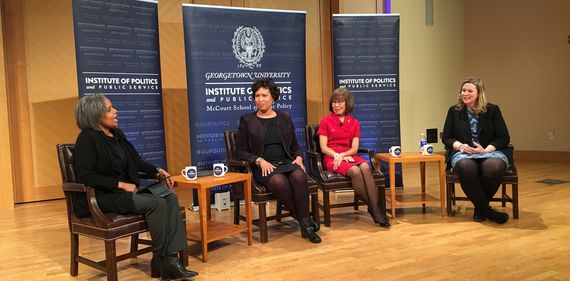
Mayors Explore Innovation, Infrastructure, and Inclusion
Mayors visited Georgetown to reflect on innovations in infrastructure delivery as a way to produce inclusive outcomes. Each discussed the strategies they are forging to ensure that balanced growth of their communities generate new opportunities for disadvantaged populations.
Georgetown’s Global Cities Initiative, the Institute of Politics and the US Conference of Mayors, hosted the third annual Georgetown Mayors Forum, featuring mayors from a cross section of communities across the country. The dialogue was moderated by Professor Sheila Foster (McCourt School of Public Policy and Georgetown’s Law Center). Chrystie Swiney (PhD Candidate, Government Department) introduced the speakers.
Each visiting mayor is a demonstrated leader who has broken glass ceilings and achieved historical firsts. Muriel Bowser is the first woman to be re-elected as mayor of Washington, DC; Nannette Whaley is the first mayor to be re-elected in Dayton, Ohio without any opposition; and Elizabeth Kautz, the seven-term mayor of Burnsville, Minnesota, is one of the first women to serve as Pastoral Minister within the Catholic Church, a position she currently holds in addition to her full-time role as mayor. Their respective leadership qualities were on full display during the lively dialogue.
Mayor Whaley talked about the transformation of a distressed plaza into a new cultural icon, the Levitt Pavilion, that creates a new setting for free concerts and a gathering place for different members of her community. Mayor Kautz recounted the creation of the “Heart of the City” initiative, a new mixed-use downtown district which boasts mixed-income residences, restaurants and a performing arts center. “We used tax-increment finance to create a pedestrian center in a car-oriented suburb. The area is welcoming to everyone, which is especially important as our city becomes more diverse,” she stated. Mayor Bowser discussed the creative linkage of unemployment and aging infrastructure through workforce development programs that train residents for high-paying jobs associated with public procurement-related local hiring requirements. “Increasingly we realize that we need to invent new tools at the municipal level to take on new challenges,” she shared.
Professor Foster steered the conversation to community tensions associated with redevelopment projects, which are often related to rising housing costs. Mayor Bowser emphasized the need to embrace a housing market where residents of all backgrounds can thrive, and discussed the essential role played by Advisory Neighborhood Commissions, which participate directly in the development review process. Mayor Whaley discussed the history of Enterprise Zones and newly created Opportunity Zones, which are designed to help attract long-term capital investments to distressed neighborhoods. “There is a lot of excitement about Opportunity Zones right now primarily because we don’t know exactly how this tool will be used by the marketplace,” Whaley offered. And Mayor Kautz spoke eloquently of her need as Mayor to actively nurture a culture of civic inclusion, where person-to-person interactions between residents can cultivate a sense of acceptance, welcome and “love” between the residents of Burnsville. Indeed, Kautz spoke of the recent 10th anniversary of the “I love Burnsville” celebration, a signature initiative which champions the demographic diversity of the rapidly evolving community.
Turning to the topic of innovation, each mayor offered insights on the ways in which they are intentionally shaping their local economies. Whether impacted by new technologies, a changing climate, migration trends or housing shortages, all panelists stressed the importance of proactive engagement. Mayor Whaley placed a spotlight on her community’s commitment to offering universal pre-K education, which she said is atypical for a city of Dayton’s size. Dedicating budget resources to strategies that pay long-term dividends is often difficult for small, resource strapped cities, she suggested. Mayor Kautz revealed her passion to break down silos between city agencies to ensure that multi-pronged public-sector solutions are presented to systemic community problems. Mayor Bowser emphasized her efforts to create an education pipeline which produces an energetic and skilled workforce for a rapidly changing labor market. She specifically emphasized the importance of 2-year higher education degree programs and certificate programs to prepare people for technology-enabled jobs in the knowledge economy.
The panel concluded with a discussion by the Mayors of the key challenges that they feel are most misunderstood by their constituents. Mayor Bowser and Mayor Kautz both spoke of the complexities of the land use approval process and the lack of understanding regarding the limits of municipal control over private investments. Mayor Whaley chuckled that after her first election, a few community members approached her to express their sympathy regarding her newfound and thankless responsibilities. She responded emphatically, “I love being Mayor! It’s the best job in the world!”

